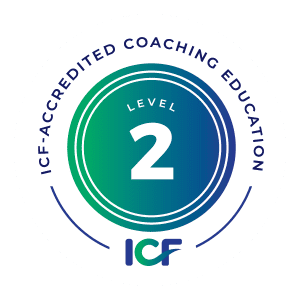ICF Level 2 Education Professional Certified Coach (PCC)

Overview of ICF Professional Certified Coach (PCC) Credential
The ICF is a highly esteemed professional coaching organization responsible for establishing standards for professional coaching practices. The ICF provides a range of credentials, including the ICF PCC Credential, intended for coaches who have achieved the ICF ACC Certification and seek to further develop their coaching abilities and expertise. Getting a PCC Certification can be one of the most critical steps in a coach’s career. Not only does PCC Credential certify your commitment to professional development, but it also opens up new doors for growth and development. The ICF PCC distinguishes coaches with the verified skills required for effective coaching practice and substantial experience partnering with clients. The ICF PCC Certification is designed for professional coaches who provide coaching services as a primary focus of their professional practice.

Upcoming Classes – ICF Level 2
| Type & Delivery | Instructor | Date | Cost & Registration | Flexible Payment Option |
|---|---|---|---|---|
| TBD | TBD | TBD | TBD | TBD |
What is the ICF Professional Certified Coach (PCC) Credential?
The International Coach Federation (ICF) has three levels of Credentials. The second level is the ICF Professional Certified Coach (PCC) Credential. If you have completed the Associate Certified Coach (ACC) Credential and want to take your coaching skills to the next level and become an ICF certified coach, then ICF PCC Certification is for you. The ICF level 2 certification is designed to help you develop your core competencies at the advanced level and in various types of coaching. Coaches who have earned the PCC credential have achieved proficiency in their knowledge of and ability to apply the ICF Core Competencies and the ICF Code of Ethics as a coaching professional.
Learning Objectives of ICF PCC Certification
Core Coaching Competencies – Advanced
- Strategies To Develop A Coaching Mindset- Conducting coaching sessions with the highest level of integrity, honesty, and transparency is essential. A coach’s attitude and approach in these client engagements should include continuous self-development, awareness, reflective practice, and maintaining a client-centered coaching approach.
- Steps To Effectively Establish A Coaching Agreement- Set the parameters of the coaching relationship, including the identification and agreement on specific coaching objectives.
- Practical Tips For Building A Strong Coaching Relationship- Trust, openness, and psychological security, especially when navigating solid emotions in the coaching dynamic.
- Improve Active Listening As A Coach- Methods that can be used with clients to help them understand themselves and their values and beliefs and to figure out any obstacles that they may be likely to encounter when pursuing their goals. A checklist of direct communication practice in coaching activity. Assist diverse clients at every phase of their coaching process to achieve the best version of themselves in their personal and professional lives.
NLP Master Practitioner
- Advanced Language Patterns and their Applications, Six Steps Reframing, Instant trance inductions, Waking hypnotic patterns and Embedded Commands, Using metaphors for deep trance marking, Nested Loops for waking trance, Advanced Modelling skills for success.
- Changing Beliefs subconsciously, Accelerated learning – mind mapping, Advanced Strategies for Modeling Excellence, Advanced Techniques for Exploring and Changing Identity and Self-Imagining, Advanced Techniques to Exploring and Changing the Structure of Subjective Experience.
Cognitive Behavioral Coaching
- Cognitive Behavioral Coaching: Definition and explanation of the CBC process ABCDE Model, Socratic Questioning, Behavioral Change Model.
- Use Cognitive Behavioral Coaching to help your clients get unstuck and overcome procrastination. Cognitive Distortions.
Transactional Analysis Coaching
- Three areas of contracting, Clarity and thoroughness of contracting, Foundational frameworks of Transactional Analysis, Life positions, Windows on the world.
- Three ego states of Parent, Adult, and Child, structural and functional ego states, OK-OK communication model, Challenges of communication, Development of script, Human hunger – recognition, structure, and stimulation.
Enquire Now
Coach / Trainer
Sivakumar Padmanabhan
Vijaya Madhavi
The Path to Becoming an Accredited ICF PCC Coach
The journey to becoming an ICF PCC certified coach involves several steps:
Step 1- Finish Coach Education: To qualify for the Professional Certified Coach PCC Certification, Completion of an ICF Level 2 Accreditation or complete ACTP program, including final assessment or 125+ hours of coach-specific education through ACC certificate programs and/or part of an ACTP program and/or completion of ACSTH program(s)
Step 2- Acquire Coaching Experience: Coaches must have completed at least 500+ hours with 25 or more clients, of which 450 hours are paid. At least 50 of these hours (paid or unpaid) must occur within 18 months of submitting your credential application,
Step 3- Mentor Coaching: Completed in Level 2 ICF or ACTP program Or 10 hours with a PCC or MCC credentialed coach over three months or longer. Three hours must be one-on-one.
Step 4- Submit an Application: Once they have obtained the necessary education and experience, coaches may apply for the Professional Certified Coach (PCC) Credential.
Step 5- Complete the Coach Knowledge Assessment (CKA): The CKA is a multi-choice test that assesses a coach’s knowledge of the ICF Core competencies and the ICF Code of Ethics. Coaches must complete the CKA to earn a Professional Certified Coach PCC Credential.
Step 6- Certification Renewal Every 3 Years: The ICF Professional Certified Coach (PCC) Credential is valid for three years. Coaches must complete 40 hours of CCE every three years and follow the ICF Code of Ethics.
PROGRAM DETAILS – Professional Coaching – For VUCA World Advanced
Language Used: English
-
- Core Coaching Competencies Advanced
- Intensive Markers Lab PCC Level
- CKA Assessment Preparation
- NLP Master Practitioner Techniques
- Cognitive Behavioural Coaching, Transactional Analysis and Coaching.
- Wellness, Empowerment, and Happiness Tools.
- Self-awareness and self-management strategies.
- Relationship management and Social awareness strategies.
Class Delivery: Online
-
- Zoom – Live Classes
- Mural -Collaboration
- Mighty Networks – E-Learning.
- WhatsApp – Group Communication
Duration: 5-6 Months
-
- Live Teaching Sessions
- Live Coaching demonstrations
- Regular 1:1 Peer Coaching- Offline
- Group Mentoring Sessions
- 1:1 Mentoring Sessions
- Lifetime access to the learning Portal.
- Private Coaching Sessions on Request
- Coaching Tools for Customization
- Small Group Cohort with 15 Students Only.
Who is eligible for Professional Certified Coach PCC Certification?
- Coaches with ICF Level 1 (ACC) Credential: Those who have earned the ACC Credential and want to improve their coaching skills, and those who are interested in ongoing education and professional development, and who want to increase their trust and visibility in the coaching industry.
- Individuals in leadership roles: People in leadership roles include managers, executives, and leaders who want to improve their coaching skills to support their teams, Human Resources (HR) professionals who want to integrate coaching methods into their roles and people who want to build a coaching mentality and approach into their leadership style.
What are the advantages of ICF LEVEL 2 PCC Certification for your coaching career?
- Accreditation: ICF is the gold standard for the coaching industry, so you’ll get the recognition and credibility of being an accredited coach.
- Increased Earnings Potential: Accredited coaches tend to make more money than other coaches because clients are more likely to pay more money for an accredited coach.
- Access to Global Network: The ICF allows coaches to network with other coaches and resources worldwide. Access to Global Network can help you develop your skills and stay current on the latest coaching trends.
- Continuation of Professional Development: Coaches must complete a certain amount of CEUs every three years to stay accredited.
Popular Tags
ICF Level 2, ICF Level 2 Certification, ICF Professional Certified Coach, PCC Certification, ICF PCC, PCC Credential, ICF PCC Certification, ICF PCC Certified Coach, ICF Level 2 Accreditation, Level 2 ICF, PCC Certificate, Certification PCC, PCC Certification Programs, PCC Coaching Certification, ICF PCC Requirements, PCC ICF, ICF PCC Credential, PCC Coaching Credential






